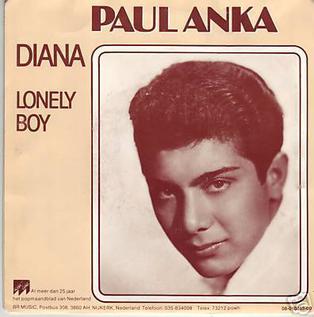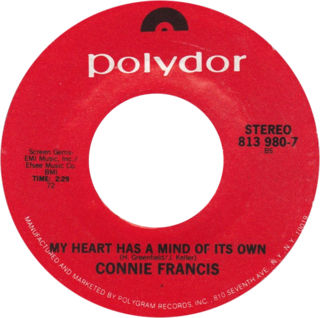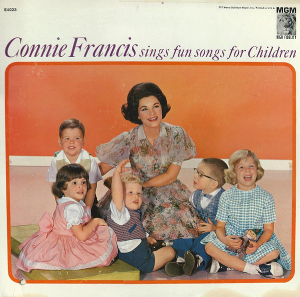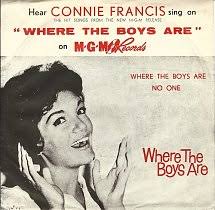Related Research Articles

Concetta Rosa Maria Franconero , known professionally as Connie Francis, is an American pop singer, actress, and top-charting female vocalist of the late 1950s and early 1960s. Called the “First Lady of Rock & Roll” in one headline of a marginal publication, she is estimated to have sold more than 100 million records worldwide.

The O'Jays are an American R&B group from Canton, Ohio, formed in 1958 and originally consisting of Eddie Levert, Walter Lee Williams, William Powell, Bobby Massey, and Bill Isles. The O'Jays made their first chart appearance with the minor hit "Lonely Drifter" in 1963, but reached their greatest level of success once Gamble & Huff, a team of producers and songwriters, signed them to their Philadelphia International label in 1972. With Gamble & Huff, the O'Jays emerged at the forefront of Philadelphia soul with "Back Stabbers" (1972), and topped the US Billboard Hot 100 the following year with "Love Train". Several other US R&B hits followed, and the O'Jays were inducted into the Vocal Group Hall of Fame in 2004, The Rock and Roll Hall of Fame in 2005, and the Rhythm and Blues Music Hall of Fame in 2013.
"You Always Hurt the One You Love" is a pop standard with lyrics by Allan Roberts and music by Doris Fisher. First recorded by the Mills Brothers, whose recording reached the top of the Billboard charts in 1944, it was also a hit for Sammy Kaye in 1945.

"Hold Me, Thrill Me, Kiss Me" is a song written by Harry Noble and originally performed by Karen Chandler in 1952. It has been re-recorded several times since then, the most notable covers being by Mel Carter in 1965 and Gloria Estefan in 1994.

"Why Do Fools Fall in Love" is a song by American rock and roll band Frankie Lymon & the Teenagers that was released on January 10, 1956. It reached No. 1 on the R&B chart, No. 6 on Billboard's Pop Singles chart, and No. 1 on the UK Singles Chart in July. Many renditions of the song by other artists have also been hit records in the U.S., including versions by the Diamonds, the Beach Boys, and Diana Ross.

"Diana" is a song written and first performed by Paul Anka, who recorded it in May 1957 at Don Costa’s studio in New York City. Anka stated in his autobiography that the song was inspired by a girl named Diana Ayoub, whom he had met at his church and community events, and had developed a crush on. Session musicians on the record included George Barnes (musician) playing lead guitar, Bucky Pizzarelli playing the "Calypso" riff on guitar, Irving Wexler on piano, Jerry Bruno on bass, and Panama Francis on drums. The song was recorded in May 1957 at RCA Studios in New York. Backup singers included Artie Ripp.

"My Heart Has a Mind of Its Own" is a song written by Howard Greenfield and Jack Keller which was a No. 1 hit for Connie Francis in 1960.

"Venus" is a song written by Ed Marshall. The most successful and best-known recording of the track was by Frankie Avalon and released in 1959, when it reached the top of the Billboard Hot 100.

"Chain Gang" is a song by the American singer-songwriter Sam Cooke, released on July 26, 1960.

"Rock-a-Bye Your Baby with a Dixie Melody" is a popular song written by Jean Schwartz, with lyrics by Sam M. Lewis and Joe Young. The song was introduced by Al Jolson in the Broadway musical Sinbad and published in 1918.
Thurston Harris was an American singer and songwriter, best known for his 1957 hit "Little Bitty Pretty One".
"Jealous Heart" is a classic C&W song written by American country music singer-songwriter Jenny Lou Carson. In the mid 1940s it spent nearly six months on the Country & Western charts. It was subsequently recorded by several pop singers.

"Lipstick on Your Collar" is a song written by Brill Building staff writers Edna Lewis (lyrics) and George Goehring (music) which was a 1959 hit single for Connie Francis.

"When the Girl in Your Arms Is the Girl in Your Heart" is a 1961 hit by Cliff Richard written by the songwriting team of Sid Tepper and Roy Bennett who would contribute fifteen songs to the Cliff Richard canon including his career record "The Young Ones". Produced by Richard's regular producer Norrie Paramor, "When the Girl in Your Arms..." featured backing by the Norrie Paramor Orchestra. Richard's own group the Shadows backed him on the B-side "Got a Funny Feeling".

Connie Francis sings Fun Songs For Children is a studio album of children's songs recorded by American pop singer Connie Francis. It is one of the few U. S. albums by Connie Francis to be released exclusively in mono. All songs were co-written by George Goehring who had provided Francis earlier that year with one of her biggest hits, Lipstick On Your Collar.

Connie's Greatest Hits is a studio album by U. S. Entertainer Connie Francis. The album features the songs from Francis' most successful singles from her breakthrough hit Who's Sorry Now? in early 1958 up to the date of the album's release in November 1959.
"Kookie, Kookie " is a song written by Irving Taylor and performed by Edward Byrnes and Connie Stevens. The single was produced by Karl Engemann and arranged by Don Ralke, and was featured on Byrnes' 1959 album, Kookie Star of "77 Sunset Strip".
"Please, Mr. Sun" is a song written by Ray Getzov and Sid Frank and performed by Johnnie Ray featuring The Four Lads and the Jimmy Carroll Orchestra. It reached number 6 on the U.S. pop chart in 1952. It was featured on his 1955 album I Cry for You.
"Burning Bridges" is a song written by Walter Scott, and best known for its 1960 recording by Jack Scott, which was a #3 hit in the US. This was the only hit song for composer Walter Scott, who was no relation to Jack Scott.

"No One" is a song originally recorded by Connie Francis in 1960. It was released as the B-side of her bigger hit, "Where the Boys Are," but charted separately. The song reached #34 on the U.S. Billboard Hot 100 during the winter of 1961.
References
- ↑ "Connie Francis, "Frankie" Chart Positions" . Retrieved March 24, 2018.
- ↑ "Billboard Top 100 - 1959". Archived from the original on January 2, 2014. Retrieved March 24, 2018.
- ↑ "Connie Francis, "Lipstick on Your Collar" Chart Positions" . Retrieved March 24, 2018.